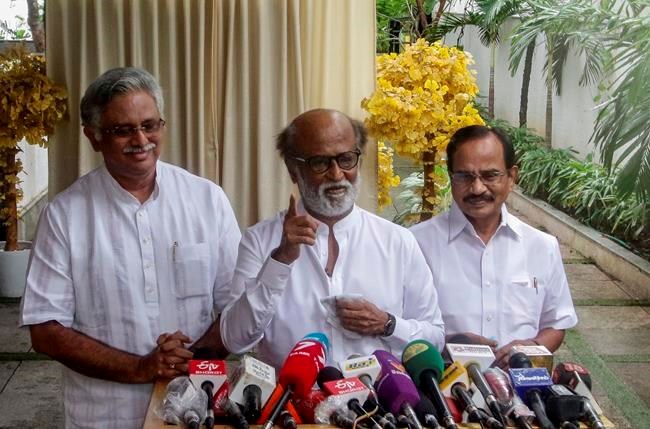NEW DELHI — Indian movie superstar Rajinikanth said Thursday he plans to launch his own political party in southern India in January, ending years of speculation by millions of his fans on his political future.
He said in a tweet that he will make an announcement on Dec. 31, apparently in relation to legislative elections in Tamil Nadu state expected around June next year. He started taking an active part in politics in 2017.
Rajinikanth, 69, is one of India’s most popular stars with more than 175 films since 1975, mostly in the Tamil and Telugu languages.
“In the upcoming Assembly elections, the emergence of spiritual politics will happen for sure. A wonder will happen,” he tweeted. An announcement on matters connected to the party's launch will be made Dec. 31, he said.
His political prospects appear bright following a vacuum created by the deaths of Jayaram Jayalalithaa, an actor-turned politician with the governing party in the state, and Muthuvel Karunanidhi, the leader of the opposition Dravida Munnetra Kazhagam party.
Cinema has always influenced Tamil politics by turning actors into popular politicians.
C.N. Annadurai and M. Karunanidhi were scriptwriters who went on to become chief ministers. M.G. Ramachandran, a top actor-turned-politician, also had a strong following.
Born Shivaji Rao Gaekwad, Rajinikanth worked as a bus conductor for three years before joining an acting school. He started in small roles as a villain in Tamil cinema and worked his way up, landing roles in Bollywood, the Hindi-language film industry based in Mumbai.
Bollywood superstar Amitabh Bachchan also tried his hand in politics as a member of India’s Parliament, representing the Congress party in support of his friend, then-Prime Minister Rajiv Gandhi, in the 1980s. He resigned after three years following allegations that he accepted bribes in the purchase of artillery guns. His name was later cleared in the scandal.
Ashok Sharma, The Associated Press



